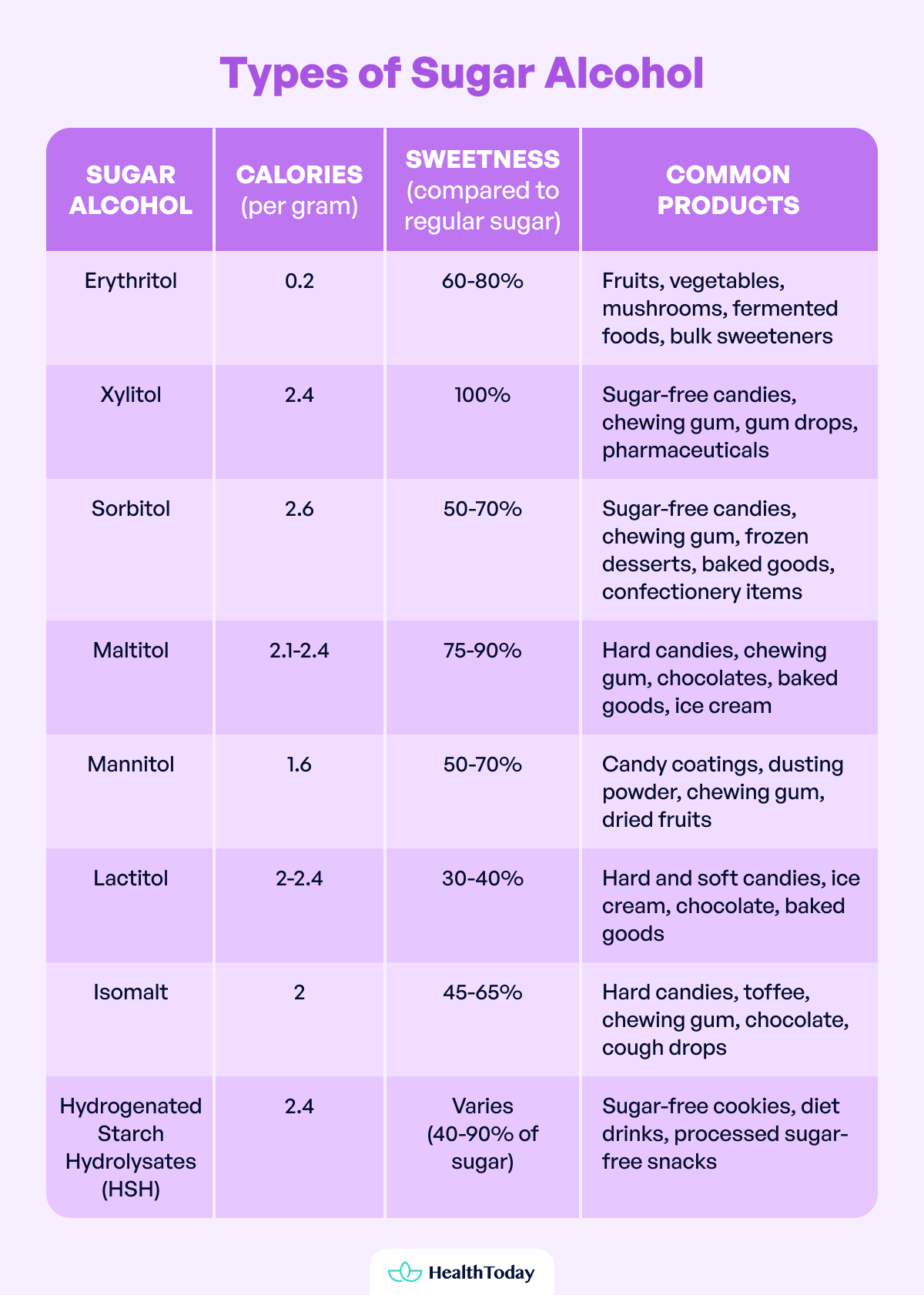Table of Contents
If you’re trying to cut back on sugar or manage a condition like diabetes, you’ve probably come across the term “sugar alcohol” on food labels. But what is sugar alcohol? Is it a healthier alternative to regular sugar? Is it even safe for people with diabetes?
You’ll find all your answers in this article. We will explain sugar alcohols, their types, their impact on diabetes, and potential side effects. Let’s explore everything you need to know about these sugar substitutes.
What is sugar alcohol?
Sugar alcohols, called polyols, are naturally found in certain fruits and vegetables or produced commercially (1). Due to their low sugar content and calories, they are often used as sweeteners and bulking agents in various products instead of simple sugars.
Sugar alcohols are neither sugar nor alcohol but share properties with both. They have a similar structure to sugar, with a hydroxyl group attached to each carbon atom. This group is a characteristic of alcohol, which is why sugar alcohols are classified as such.
Types of sugar alcohol
There are different types of sugar alcohols found in sugar-free products. All of them are safe if you consume them moderately but excessive intake can cause digestive issues. Here are some common types:
Xylitol
Xylitol, a five-carbon sugar alcohol, is derived from plant products (2). It is as sweet as sugar but has 40 percent fewer calories. It provides 2.5 calories per gram and has a glycemic index (GI) of 13, so it doesn’t raise blood sugar quickly. It is found in mints, chewing gums, and dental care products.
Erythritol
Erythritol is another type of sugar alcohol that provides just 0.2 calories per gram (2). With a GI of 0, it is an excellent choice for those looking to maintain stable blood sugar levels. Besides that, erythritol has minimal risk of digestive discomfort.
Sorbitol
Sorbitol occurs naturally in fruits and vegetables and is mostly obtained from potato starch (2). It provides 2.6 calories per gram and has a GI of 9. Sorbitol is often used in sugar-free products and as a moisture-stabilizing agent. If you consume it in large quantities (20 to 50 grams), you may experience digestive issues.
Lactitol
Lactitol has a mild sweetness and 2 to2.4 calories per gram (3). Its GI is 6, which makes it another favorable choice for blood sugar management. It is used in chocolate and baked goods. Lactitol is well-tolerated by most people, but like other sugar alcohols, it can cause digestive discomfort with overconsumption.
Mannitol
Mannitol has a GI of 0 and provides 1.6 calories per gram (3). It is often used in medical settings as a diuretic but can also be found in confectionery products (candies, chocolate, and chewing gums). Mannitol may also cause bloating and diarrhea in some people.
Maltitol
Maltitol is roughly 90 percent as sweet as sugar and provides 2.1 to 2.4 calories per gram (3). Its GI of 36 is higher than that of other sugar alcohols, but still lower than regular sugar. It is used in sugar-free chocolates and baked goods. Like sorbitol, maltitol can cause digestive discomfort if consumed in large quantities.
Isomalt
Isomalt is 45 to 65 percent as sweet as sugar. It provides two calories per gram and has a GI of 9 (3). Therefore, it is also a great choice for those managing blood sugar levels. Isomalt is used in hard candies and sugar-free baked goods. Compared to other sugar alcohols, it is less likely to cause digestive issues.
Hydrogenated starch hydrolysates
Hydrogenated starch hydrolysates (HSH) are less sweet than sugar and provide about 3 calories per gram (3). They have a variable GI and are used in a variety of food products.
Types of sugar alcohol

Products that may contain sugar alcohol
Sugar alcohols are often found in sugar-free and “diet” products. Some examples are:
- Chewing gum
- Sugar-free candies
- Ice cream
- Fruit spreads
- Low-calorie desserts
- Baked goods
- Chocolates
- Cough drops/syrups
- Puddings and frostings
- Cakes and cookies
- Jams and jellies
- Energy bars
Are sugar alcohols bad for you?
Sugar alcohols are safe if you consume them moderately. Otherwise, they may cause side effects with excessive consumption.
Recent studies have suggested that sugar alcohols can improve blood sugar and prevent tooth decay (4, 5).
Unlike regular sugar, sugar alcohols are low in calories, and are also beneficial in weight control. Moreover, sugar alcohols are safe for people with diabetes and can satisfy their sweet cravings without any harm.
However, high intake of sugar alcohols may cause negative health effects such as gas, bloating, and diarrhea (6).
A recent study also reported the risk of heart disease due to the overconsumption of erythritol (7). That’s why you should always consume sugar alcohol in moderation to prevent any side effects.
Sugar alcohol vs. sugar

When it comes to sweetening your foods and beverages, you often hear about sugar and sugar alcohol.
Both are found naturally in foods and are added to processed items. However, they have different chemical structures, caloric content, and impacts on your health.
Sugars are sweet-tasting carbohydrates that your body can convert into energy. They are composed of carbon, hydrogen, and oxygen atoms. Sugars are naturally found in fruits, vegetables, grains, and dairy products and are also added to many processed foods.
Conversely, sugar alcohols resemble both sugars and alcohols in structure. They are also found in fruits and vegetables but are less efficiently absorbed or digested than regular sugar, resulting in fewer calories.
Furthermore, they have relatively lower GI than simple sugars, which means they don’t cause spikes in blood sugar levels.
Is sugar alcohol better than sugar?
Yes, sugar alcohol is better because it contains lower GI and calorie content compared to sugar itself.
Sugar alcohol is generally safe for your health, while sugar can have negative effects (8). Some of the key differences between sugar and sugar alcohol benefits are listed below:
- Caloric content: Sugar provides about four calories per gram, contributing to energy intake. In contrast, on average, sugar alcohols contain only around two calories per gram. This reduced caloric content makes them popular in weight management products (9).
- Glycemic effect: Regular sugar can raise your blood sugar level quickly, while sugar alcohol doesn’t do so due to its slow absorption. This happens because sugar has a higher GI than sugar alcohol (9, 10).
- Dental health benefit: Sugar alcohol doesn’t cause tooth decay like sugars do. Research shows that xylitol has a protective effect against cavities, making it a popular ingredient in chewing gum and dental care products (11).

Sugar alcohols and diabetes: Does sugar alcohol raise blood sugar?
Sugar alcohol is considered a healthy alternative for people with diabetes as it has minimal effects on blood sugar.
A comprehensive review described the benefits of sugar alcohols for managing diabetes (12). As discussed earlier, sugar alcohols are absorbed slowly and incompletely from the small intestine into the blood.
While sugar alcohols can increase blood sugar levels, they do so at a lower rate compared to regular sugar. That’s why the American Diabetes Association supports their use in small or moderate amounts (13).
There is also some evidence from studies in lab rats that sugar alcohols can lower blood glucose levels when given as a supplement (14).
A study showed that meals containing erythritol led to lower blood sugar and insulin levels than meals with sucrose (15). The study suggested that erythritol could be a viable alternative to sugar because it doesn’t affect appetite control or the craving for sweet foods.
Another study on diabetic rats showed that erythritol has antioxidant properties and improves blood sugar levels in the body (16).
Sorbitol also has beneficial effects on blood sugar control. Research indicates that it can prevent glucose absorption in the intestines and enhance glucose uptake in muscles (17). In the same study, sorbitol has been shown to delay stomach emptying and reduce blood glucose levels in rats.
In a nutshell, sugar alcohols are a safe and healthy alternative for people with diabetes. They either improve or do not affect blood sugar levels, which makes them a great choice for diabetes management when used in moderation.




Side effects of sugar alcohols
Sugar alcohol can be helpful for those looking to reduce their sugar intake. However, like with most things, moderation is key.
The main downside of sugar alcohols is their impact on digestion, which can lead to some uncomfortable side effects.
Here are some of the common side effects of sugar alcohol:
- GI symptoms: One of the most reported side effects of sugar alcohol is gastrointestinal discomfort. When sugar alcohols reach the large intestine, the gut bacteria ferment them, producing gas. This occurs mostly in individuals with sensitive digestive systems or those consuming sugar alcohol in large quantities.
- Laxative effect: Some sugar alcohols in high doses, particularly mannitol and sorbitol, can have a laxative effect. This means they can stimulate bowel movements and potentially cause urgency.
- Other effects: A recent study published in 2023 reported that high consumption of erythritol can have long-term effects on heart health (18). To be exact, people with erythritol in their blood are at a higher risk of developing serious heart conditions such as heart attack or stroke within three years. However, more research is needed to determine if it is safe for long-term use.
How to read sugar alcohols on nutrition labels?


Understanding the content of sugar alcohols listed on a nutrition label can be crucial. This is especially important if you’re managing your carbohydrate intake or have dietary restrictions. Here’s what you need to know to understand sugar alcohol content on nutrition labels:
- Locate the total carbohydrates: Find the ‘Total Carbohydrate’ section on the nutrition facts label. This will include all types of carbohydrates present in the food, including sugar alcohols.
- Identify sugar alcohols: Sugar alcohols may be listed separately within the total carbohydrates. They will be listed by their names like sorbitol, xylitol, mannitol, isomalt, maltitol, and lactitol.
- Calculate the net carbs: Since carbs can affect blood sugar levels, calculate the net carbs before using any product. To determine the net carbs, subtract half the grams of the sugar alcohol from the total carbs (19). For instance, if there is a product with 50g total carbs and 20g sugar alcohols, then it would be calculated as follows: 50g total carbs – (20g sugar alcohols/2) = 40g net carbs.
- Check the serving size: Remember to consider the serving size to accurately calculate the carbs you’ll consume. Adjust your carb count based on whether you eat more or less than the serving size.
- Check the warning about the laxative effect: Products containing mannitol or sorbitol might include a warning about their laxative effect (20). Since the body can’t completely absorb these substances, consuming large amounts can lead to gastrointestinal problems. Make sure to double-check, especially if you have a sensitive digestive system.
What are the best sugar alternatives for people with diabetes?
For individuals managing diabetes, finding the right sugar alternative is crucial for maintaining blood sugar levels. Here are three of the best options:


- Stevia
Stevia is a natural sweetener derived from the leaves of Stevia rebaudiana. It has zero calories and thus does not raise blood glucose levels. Therefore, it is an excellent sugar alternative for people with diabetes.
However, there is mixed research about the effect of stevia on blood sugar levels. One research study indicated that stevia consumption doesn’t affect fasting blood sugar or glycemic response (21).
In contrast, a systematic review reported that stevia might lower blood sugar levels in people with diabetes, though human studies in this area are limited (22).
- Monk fruit extract
Monk fruit extract, also known as luo han guo or Swingle fruit, is another natural sweetener good for people with diabetes. It contains antioxidants called mogrosides, which are responsible for its sweetness (23).Even with zero calories, it is 100 to 250 times sweeter than simple sugar (24).
A rat study demonstrated that the luo han guo extract in synbiotic yogurt delayed the progression of diabetes (25).
However, two human studies found no difference in blood glucose levels between those who used monk fruit extract, and those who consumed sucrose (26, 27). Thus, further research is needed.
- Erythritol
As described above, erythritol is a sugar alcohol with zero calories and sweetness, similar to sugar. Once absorbed into the bloodstream, it passes unchanged into the urine, preventing an increase in blood sugar levels.
Research shows it is effective in reducing blood glucose levels in rats with diabetes (28). However, more research is needed in humans, as results are mixed (29).
Furthermore, it has antioxidative properties that protect cells from free radical damage (30). However, be mindful of consuming too much erythritol as it might increase the risk of heart disorders (31).




Is sugar alcohol bad for your teeth?
No, sugar alcohols are not bad for your teeth. This is because bacteria in your mouth cannot ferment them, so they help maintain oral health.
Does sorbitol raise blood sugar?
Sorbitol has little effect on blood sugar levels compared to foods made with traditional sweeteners like table sugar. It is often added to foods marketed to people with diabetes for this reason.
What foods are sugar-free?
Sugar-free foods include vegetables, especially leafy greens, and proteins like meat, poultry, eggs, fish, and nuts. Whole grains and legumes are also good options, although some may contain natural sugars.
What is sugar alcohol in ice cream?
Sugar-free ice cream contains sugar alcohols like erythritol, sorbitol, and maltitol. These give it a sweet taste without causing side effects like high blood sugar levels or tooth decay.
Summary
What is sugar alcohol, then? It is a carbohydrate used as a sugar substitute due to its lower calorie content and minimal impact on blood sugar. This can be beneficial for individuals managing diabetes or weight. However, moderation is key, as sugar alcohols can cause digestive issues if consumed in high amounts. Don’t forget to include them into your carb intake and consult your doctor if you’re unsure about incorporating them into your diet. Enjoy your sweet treats responsibly!

















Comments
0